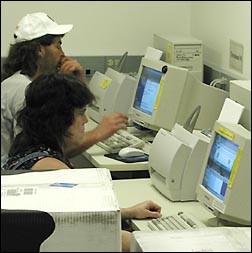Library gets new computers
 The Paynesville Public Library has received two new Gateway computers and a laser printer from the Bill and Melinda Gates Foundation.
The Paynesville Public Library has received two new Gateway computers and a laser printer from the Bill and Melinda Gates Foundation.Library staff is attending training for the new computers this week, and the new computers - which arrived a couple weeks ago but have been in boxes since then - should be installed next week. The computers will replace the two computers that provide Internet access at the public library, which is located at 119 Washburne Avenue in downtown Paynesville.
The Paynesville library has offered Internet access on computers for nearly seven years. The Great River Regional Library (GRRL) - centered in St. Cloud and including 31 branch libraries - started adding Internet access in 1993 and finished in 1995, said Verne Oleksowicz, GRRL's deputy director of branch services.
The GRRL received 47 computers, worth nearly $187,000, from the Gates Foundation, founded by Microsoft founder Bill Gates. Most of the computers are in branch libraries like Paynesville, but the main library in St. Cloud also received a computer lab with 11 computers, which can be used for staff training or computer classes for the public.
The new computers in Paynesville should be faster than the old models, said Gretchen Vork, branch librarian. The computers offering Internet access at the library have always been busy, added Vork. Patrons can sign up for half-hour blocks up to a week in advance with their library card.
"You don't often see them empty," said Vork of the computers. "They tend to get used nonstop."
On busy days - Mondays, Tuesdays, and Fridays - most people only get a half hour on a computer. On slower days - Wednesday mornings, Thursdays, and Saturday afternoons - patrons are more likely to be able to use the computers for longer periods of time, said Vork.
The local library does not have enough access to add more computers, which is why the new computers will just replace the existing ones. The library relies on a 56K phone line for its Internet access.
In addition to the two new computers, the library has four other computers that use the Internet to access the central files in the mainframe at the St. Cloud library. Two computers for doing searches and reserving material are open to the public, and staff use two computers to check out and check in material.
Vork said the speed of the computers already slows considerably when all are in use.
The new computers will have some new features: reference programs (atlas, dictionary, and encyclopedia); word processing and design programs (Excel 2000, Word 2000, Front Page 2000, Publisher 2000 and others); tutorial programs for these programs (Excel 2000, Word 2000, and HTML); and children's programs (including Magic Bus, math tutorials, Barney, and Dr. Seuss).
The new computers will even have a mouse tutorial for first-time users who are unfamiliar with how to work the mouse. The librarians often help users get familiar with the computers, said Vork, but the ability of librarians to help is pretty hit or miss. The amount of time the librarians have depends on how busy the library is that day.
Patrons have indicated a desire for word processing programs for quite some time, according to Vork. "The big one I hear is for resumes, but there are other needs," she said. One concern for Vork will be how the new features increase the demand for the already popular computers. She suggests that patrons who may need more than a half hour to work on the computer try to come in during slower times, like Wednesday mornings, early Saturday mornings, or before school is out for the day.
The computers are used mainly by people who do not have computer access at home, according to Vork. Travellers also expect public libraries to have Internet access these days. "People are getting used to the fact that libraries have Internet access," said Vork. They don't even ask if the library has it anymore, she added.
Computers are just one form of alternative media that's growing in popularity at the library. "Our big-gest business is books," explained Vork, "but we're seeing lots of CDs go out, lots of movies, and books on tape are really popular."
The city of Paynesville has had a public library since 1908, when a group of citizens - the Booklovers' Club - helped form it as a cultural outlet through reading. The library moved from the old city hall to its current location a decade ago and joined the GRRL system in 1991.
More information about the library system is available at www.griver.org. More information about the Gates Foundation can be found at www.gatesfoundation.org.
Contact the author at paypress@lkdllink.net • Return to News Menu
Home | Marketplace | Community